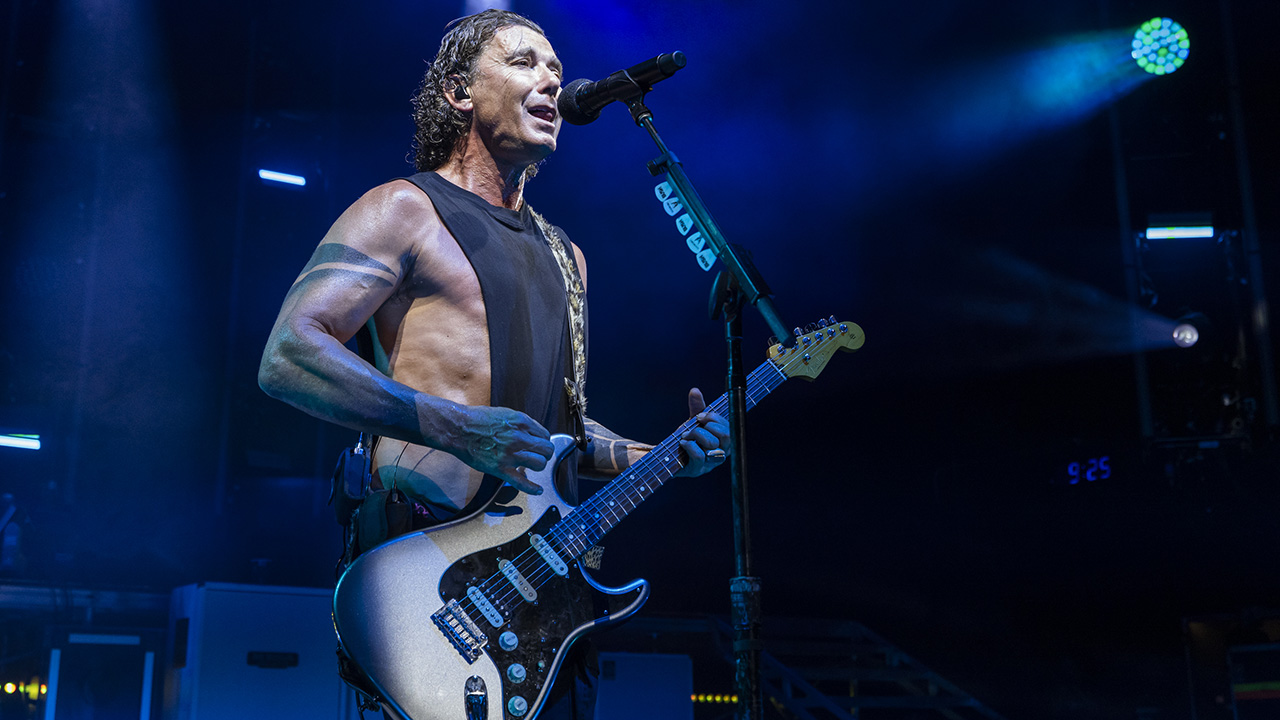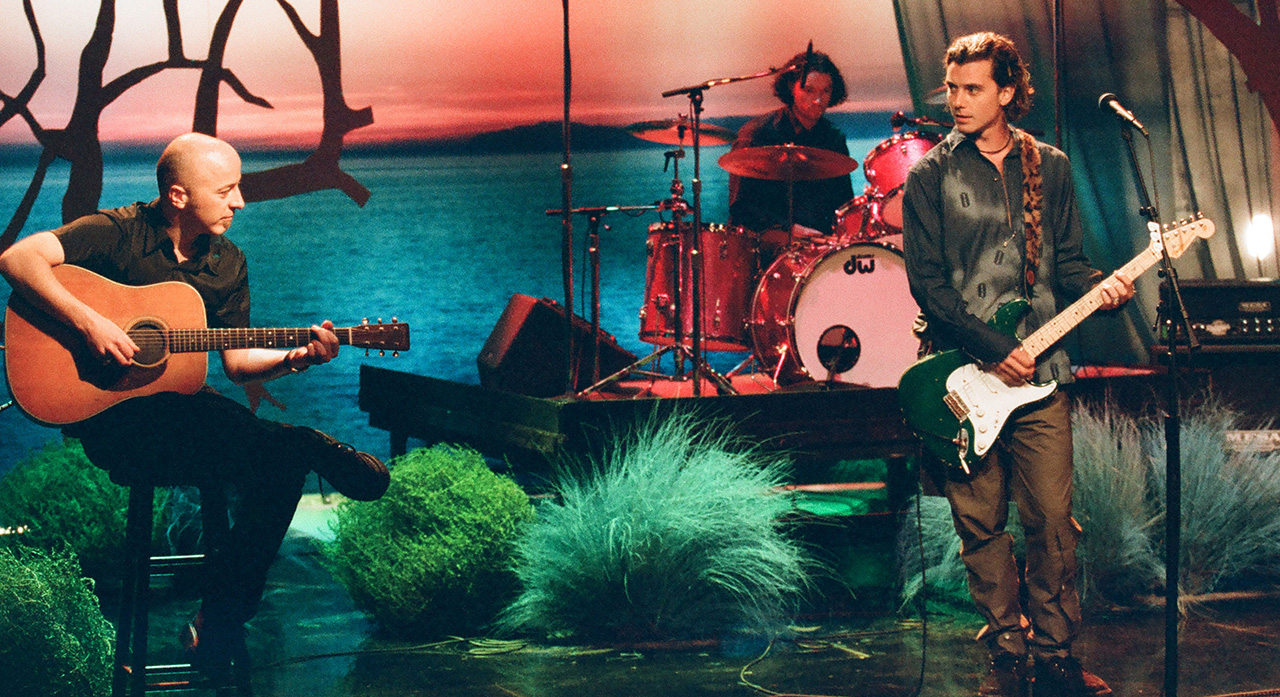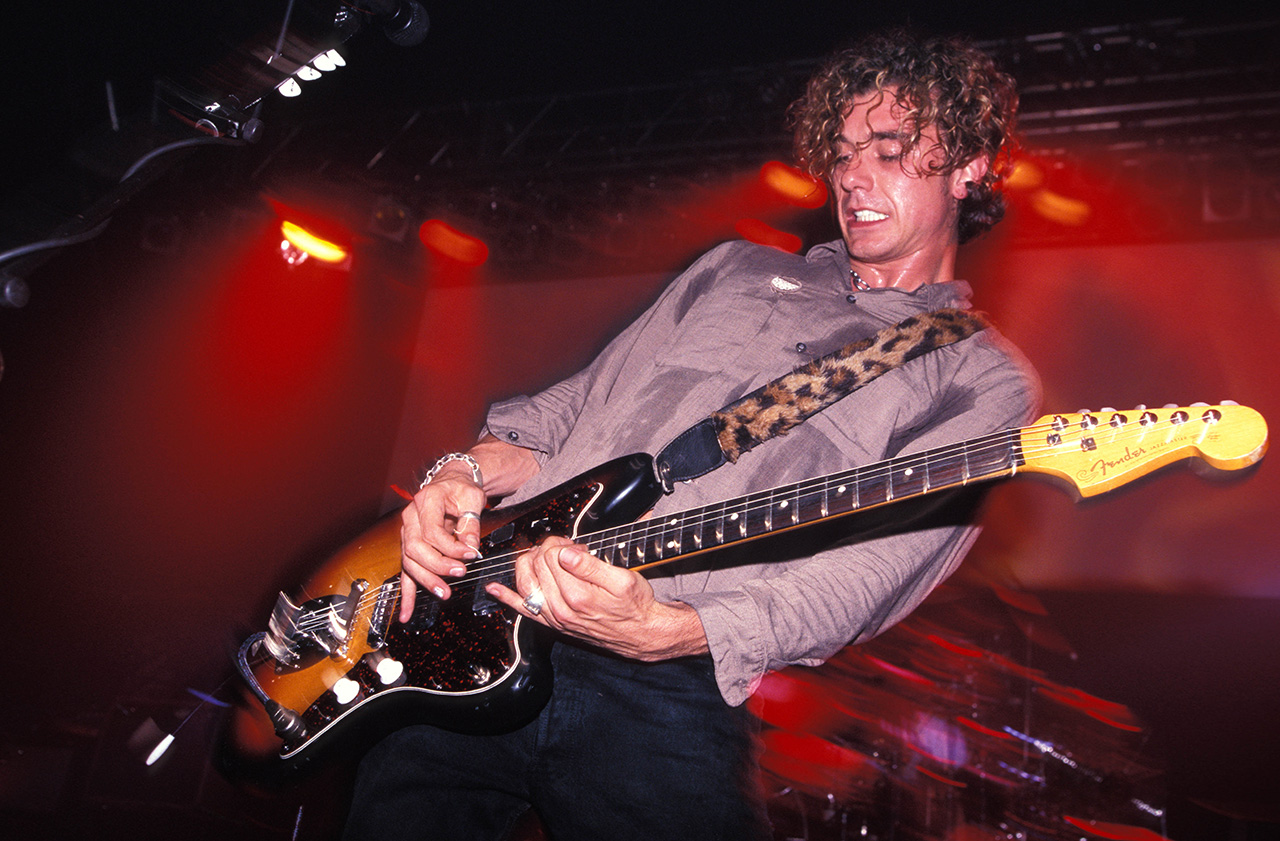“I wish we’d had bidding wars – a mad time dining out with everyone falling in love with us. But no; we had one dude with a small label who believed in us”: Gavin Rossdale on the sacred and absurd experience of making Bush’s Sixteen Stone
30 years on, the band leader recalls how his partnership with former guitarist Nigel Pulsford was the catalyst that sent him into a world of melody, twin tape recorders – and taking a lesson from Massive Attack

In the mid ‘90s, grunge wasn’t the hot ticket in the UK that it was in the US. That changed when London native Gavin Rossdale wrote a score of songs that would become Bush’s 1994 debut album Sixteen Stone.
With Nigel Pulsford aiding Rossdale on guitar, songs like Glycerine, Machinehead, Comedown, Little Things and Everything Zen put Bush on the map.
Rossdale isn’t one for nostalgia. “It’s way healthier to live in the present,” he tells Guitar World. “I don’t like to look in the rearview mirror that much.” But that doesn’t mean Sixteen Stone has no value to him.
Marvelling that, as the album reaches its 30th anniversary, it’s been certified platinum six times over, he says: “It’s madness. I feel this debt to it. It feels like, for anyone who’s ever loved this band, it’s their birthday too.”
He’d formed two bands before Bush, which flamed out for lack of direction. But he found his guitar muse in Pulsford. “I was happy that I’d finally made an album," Rossdale says. “No matter what happened after that point, there was a record to reference.”
He describes his guitar playing as “visceral,” adding that Pulsford was more “studied.” That, along with a shared vision, made Bush successful. “With those other bands before it was like the blind leading the blind,” he says.
“But I’ve always loved melody. If you grew up in a country where Queen is in your DNA, you want to sing stuff with melody. I like memorable songs. I love it when the Scissor Sisters get it right as much as when Tool gets it right. Melody is the grace of all things.”
Get The Pick Newsletter
All the latest guitar news, interviews, lessons, reviews, deals and more, direct to your inbox!
Rossdale kept getting it right until Pulsford departed on good terms in 2002. “It was an incredible ride. We stopped touring to take a break when the guitar player just wanted to see his kid grow up a bit – and we just never picked it up again.”
He emphasizes: “There was no ill will, no weird feelings. It just morphed into something else. And because I wrote those songs, I picked it up as a new incarnation that’s been with me ever since.”
Pulsford is gone, but Sixteen Stone’s legacy remains. “It’s given so much to so many people,” Rossdale says. “People might pass by and go, ‘Fuck that band’ – that’s normal. But there’s every show, they’re in the presence of the full power of the band.
“I’m sure some people don’t like it; we’re not immune to that. But generally, it’s been fucking 30 years of applause.”
While putting together Sixteen Stone, did you have an inclination that you had a winner on your hands?
“I’ve been in loads of interesting times when I was thinking we should have been doing better. I wish we’d had bidding wars – a mad time dining out with everyone falling in love with us. But no; we had one dude with a small label [Trauma] who believed in us.

“Life doesn’t allow you to think you have something special; but I knew it was a complete representation of the songs we’d come up with.”
Which song came to you first?
“I’d met Nigel, and I asked, ‘Do you want to be in a band or write a song?’ He had no interest in a band or writing but he said, for shits and giggles, he’d be happy to record with me.
“The first song I took to him was Comedown. He did a really good demo, but when I first listened to it in the bath, I could really hear the Billy Cobham bassline that Massive Attack used for Safe From Harm.
“The bass player played something similar to that, but not quite that. I was like, ‘Fuck, it should be that – that’s brilliant.’ Massive Attack took it from Billy Cobham, so what’s the difference? Plus I had no concept that anything I would ever do would be public.”
Did that Safe From Harm experience help focus your ambitions?
“I thought, ‘How can I create a band? If I’m doing my music with a band I love, I could make a record, fuck off, and go do something else.’ I told myself, ‘Just make a record that sums up all these years of giving yourself to music.’
“Within 18 months I’d made enough songs to be able to get a record deal. We made that record two years into the life of Bush. I remember being surprised at the collaboration between Nigel and me – I could bring him my songs, and he’d turn them into something way better than what I’d brought.”
Nigel is a great guitar player. He just did his job… I love it when people do their jobs
What was it about Nigel’s guitar playing that stood out?
“He put lead lines on it that just made things super exciting. He’d find excellent notes to go against my voice. He’s a great guitar player. He just did his job. Basically I love it when people do their jobs. I was really lucky; and now I’ve got Chris Traynor, who’s equally fantastic.”
Nigel on lead and you on rhythm developed the signature Bush guitar sound. What was the trick?
“I’m a very humanistic guitar player – very raw and very visceral. Nigel was incredible: very studied, very particular and very meticulous, and through a great love of jazz and classical music, he covered a wide range of musical styles. He really was a fucking perfect foil for me. And now, Chris is.”

Another standout track is Glycerine. Do you remember working it out?
“I physically remember where I was, for some reason. I wrote it in my basement apartment in London. Four people were living there at the time. There was a blue underlay carpet, no top one – I had this really weird Feng Shui, OCD bullshit, where it was like a graffiti-covered kitchen, no carpet, just the underlay.
“I stood there in my bedroom; I could see that blue carpet lying to my left through the door. I turned the recorder on and wrote that one in two passes.”
Did Glycerine seem special straight away?
“I was in full fear that I’d just repeated someone else's song, because it was way too accomplished for the kind of stuff I’d been writing piecemeal.
“I'd write a riff on a tape recorder, then I’d record my voice while playing that recording of Machinehead, or whatever, on another machine. So I was always walking around the parks with two tape machines.”
When the time came to properly record, how did you and Nigel create Bush’s massive wall of guitar sound?
“With Comedown, when I was lying in the bath, I knew that bassline was moving it into an area of music that really represented me. Can you imagine having been in two bands where you love music, you have an opinion about music, but you're not playing music?
“When The Stone Roses were happening and I was in my first band, I’d be like, ‘Let’s do some fucking music like that.’ Then it was, ‘What’s My Bloody Valentine? That’s really fucking interesting!’ Bush was the first time I could indulge in those sounds and pursue them.”
It must be gratifying to see Sixteen Stone become so loved.
“It’s incredible. If you’re in the business of making music and getting lost in it, it’s a series of people willing you on, giving you the power and arrogance to think you’re making something that people might want to listen to. It’s an incredible thing to have a record of that magnitude.”
Although you don’t like to look back, does Sixteen Stone matter as much to you as it did in 1994?
The best thing about songs is they really go into people. It’s sacred; it becomes their song
“It’s the same for anyone who lasts at doing anything. It’s really wild; I love it – but to me it belongs to everyone now. When you make music or anything that goes into the world, it belongs to the people. The best thing about songs is they really go into people. It’s sacred; it becomes their fucking song.
“I always think that any kind of nostalgia or recollection of songs is about other people’s memories of those songs – more so than mine. I just launched it into turbo drive, like a rocket ship.”
- The 30th anniversary edition of Sixteen Stone is on sale now via Craft Recordings.
Andrew Daly is an iced-coffee-addicted, oddball Telecaster-playing, alfredo pasta-loving journalist from Long Island, NY, who, in addition to being a contributing writer for Guitar World, scribes for Bass Player, Guitar Player, Guitarist, and MusicRadar. Andrew has interviewed favorites like Ace Frehley, Johnny Marr, Vito Bratta, Bruce Kulick, Joe Perry, Brad Whitford, Tom Morello, Rich Robinson, and Paul Stanley, while his all-time favorite (rhythm player), Keith Richards, continues to elude him.
“I heard the Money solo and thought, ‘This is amazing!’ So I sent David a telegram saying, ‘Remember me? I'm in a band now called Roxy Music’”: Phil Manzanera on his friendship with David Gilmour, and the key to the Pink Floyd man's unmistakable tone
“It’s really quite genius, but also hard to learn – it sounds insane, but sometimes the easiest songs still get me nervous”: Kiki Wong reveals the Smashing Pumpkins song she had the most trouble with














